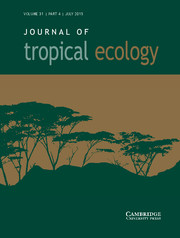Article contents
Leaf and root attributes as growth and phosphorus uptake determinants in two grass species from South America’s natural grasslands
Published online by Cambridge University Press: 10 March 2021
Abstract
Phosphorus uptake by grass species from natural South American grasslands can change depending on root and leaf attributes capable of determining higher, or lower, relative growth rate. The aim of the current study is to investigate whether leaf and root attributes capable of determining leaf and root area production in native C4 grass species Axonopus affinis and Andropogon lateralis are related to higher relative growth rate (RGR), P uptake capacity (maximum P influx; Imax) and concentration. Species grown in 2-litre pots with added nutrition solution were subjected to two treatments, namely 5 μM P l−1 and 30 μM P l−1. Solution aliquots (10 ml) were collected for 30 hours at the end of the study to determine P concentrations. RGR was 3.6 and 2.8 times higher in A. affinis than in A. lateralis in treatments with 5 μM P and 30 μM P. Axonopus affinis recorded the highest P concentration in leaf tissue. This outcome was associated with Imax 85% higher in A. affinis. High RGR was associated with larger leaf and root surface area per dry mass unit, as well as with high P influx capacity and with higher affinity transporters. These species often prevail in areas accounting for greater natural fertility and are more responsive to phosphate fertilization.
- Type
- Research Article
- Information
- Copyright
- © The Author(s), 2021. Published by Cambridge University Press
References
- 4
- Cited by



